Stephanie Hansen:
Hello everybody, and welcome to Dishing with Stephanie's Dish, the podcast where we talk to people that are obsessed with food and they come across their obsessions through cookbooks, podcasts, content writers, and today we're talking with
. And I was excited because I said I don't get to talk to fellow podcasters very often. Congratulations on your podcast. It is the Dinner Plan podcast.Maggie is the former digital director of Epicurious. She also has many newsletters. So I'm excited to talk to you about that.
plus , plus - You are my person.Maggie Hoffman:
Maybe too many newsletters. We'll see.
Stephanie Hansen:
Yeah, I'm sure it's a lot. So where should we jump in first? Let's just, let's talk about your newsletters because you already commented on my background. I have a lot of vintage pieces in the background. How did you start the Vintage Table or what was your first newsletter?
Maggie Hoffman:
Well, it's a little bit complicated, but I actually started with what to drink. In sort of a previous life, I was mostly a cocktail writer. I used to review bars for the San Francisco Chronicle. And I've written two books about cocktails that were published by Ten Speed.
The One-Bottle Cocktail: More than 80 Recipes with Fresh Ingredients and a Single Spirit
Batch Cocktails: Make-Ahead Pitcher Drinks for Every Occasion
And so that's like a whole side of my life. And I was running a drinks newsletter for Epicurious when I was there. And when I left, that was sort of the, the going independent. I was able to send one newsletter to that audience and say this is where I'll be.
So, you know, I don't update that one as often, but I do have. I like to talk about what I'm drinking, you know, when I'm trying new non alcoholic beers, or sometimes I'll share cocktail recipes from new books I'm reading. So that one was actually first. My main gig is the Dinner plan, which is a podcast and substack. It's sort of a living, breathing system. So the podcast goes Every week I interview a cookbook author every week. We talk about inspiration and where they find dinner ideas and the books they love. And then at the end of every show, someone calls in and shares what's in their fridge and the cookbook author guest comes up with a dinner idea for them.
And usually these folks are people with cookbooks, often new cookbooks. And so in the substack each week, we share all of the links to all the recipes that they have talked about so people don't have to like, take notes. Anything they've recommended, it's all there in the newsletter. And then we reprint a recipe from Their books. You can get a little preview of the book, and that's why you should sign up for the newsletter. Someone told me they were taking notes on the show, and I was like, oh, no, no, no, you don't have to do that.
Stephanie Hansen:
You have such good notes on the episodes.
Maggie Hoffman:
And, I mean, I listen to these things over and over.
Stephanie Hansen:
You have, like, attached and linked every single recipe idea anyone's ever discussed in the pod. I mean, it's extensive, you guys, you gotta follow.
Maggie Hoffman:
And then I have a big list, which I think is really fun, of every book that has gotten recommended. So each person comes with, like, two or three ideas. Well, that has become a very big list. We're getting close to 50 episodes, and each person. I mean, you do the math. So, yeah, that's the main project, and then the vintage table is a little side project, and maybe they'll get merged at some point, but I just cannot buy every piece of vintage tableware that I love. And so I thought I should probably start sharing the links so that I get. Maybe other people will take them off the market.
Stephanie Hansen:
That is smart, because once you start, like, in that Facebook marketplace or Etsy channel of looking for vintage things, ebay, they find you. Yeah, yeah.
Maggie Hoffman:
So there's usually, like, a theme, you know, sort of beachy things for summer or, you know, whatever is the thing that I'm sort of obsessing over. And that's just for fun, but it's a lot of fun.
Stephanie Hansen:
Yeah, I. I find it very fun. When you were so how long were you the digital director at Epicurious?
Maggie Hoffman:
I think I was there a total of four years. I started as the senior editor under David to Markin, who's at King Arthur Flour now, and I took over running it when he left.
Stephanie Hansen:
And we're probably better off now because we have so many different avenues for creators. Right. Substack has really, like, democratized the creating world. From podcasting, did you find, like, you know, when you work for a big company, there's resources and podcast studios, and then all of a sudden you're on your own and you have to figure it all out. Substack makes it so easy.
Maggie Hoffman:
Yeah, substack and all the other ways. You know, I think everyone's ability to sort of launch their own independent media is truly exciting, and people are doing it in all sorts of, you know, not just substack, but also their own websites and Patreon and, you know, people have huge success.
Stephanie Hansen:
Do you think that that is. I mean, I feel sad about that. I think it is cutting into traditional magazine resources, digital resources, digital archives, because people don't necessarily need that to be seen anymore. They can create their own engines. But I also, like, every time I get a magazine, it's a little bit thinner. I think, like, oh, don't wait. Because I still love some of those traditional printed forms and I love linear television, and I also like terrestrial radio still. Like, I want there to be all those things and not have it be just one thing.
Maggie Hoffman:
Yeah, I mean, I think it's a little more complicated. I wouldn't blame independent creators for the shrinking of food media. I think that has a lot more to do with, you know, everything moving to digital and then sort of being flooded with ads and then search changing so much. I mean, there's just so many things that have shaped that. And I think it's incredibly sad to see, you know, so much of, you know, both book publishing and magazine publishing struggle. It has to do with ad dollars. And, you know, those are places where there are the resources for everything to be tested and tested again. And, you know, I think there's going to have to be a question of how many independent creators people can support.
And I don't think advertising is over. I think that is a way to fund some of this as well. You know, if an advertiser wants to support an independent creator, I think that's great. The budgets are going to be smaller than what they were paying for something else. And maybe it can all coexist, I'm.
Stephanie Hansen:
Hoping, because I think it ultimately, if it raises all boats right. But I mean, we are consolidating in a pretty rapid clip with the top seven media companies and social influencers. But when you think about your podcast and when you conceived it and knew who you wanted to talk to, what did that look like? Like, did you know right away what you were going to zero in on?
Maggie Hoffman:
Did I know? I was at the beach and was taking a long walk with my husband and sort of saying, were to do this thing, what would it be? I had gone through the process of pitching a show to Conde, which they decided they didn't want, and so I was pretty heartbroken and kind of had lost confidence. I've been in food media about 15 years now, a really long time. I actually worked in book publishing before that and blogging, and I was at Serious Eats in very early, exciting years. And. And I love being a part of that community. I love being able to see what's coming soon. Like, one of the biggest joys when I first started at epicurious, was I showed up and there was this stack of cookbooks on one of the, like, files sitting on one of the file cabinets. And people would sort of say, hey, does anybody have a copy of this? Does anybody have a copy of that? I was like, this is where I'm supposed to be like, you know, I mean, you can see the.
Stephanie Hansen:
Yep.
Maggie Hoffman:
Stacks of cookbooks continue. And so I sort of was like, what will be Feel like it sort of captures some of that excitement that I could do independently, and what would it take to do independently, and who would I want to talk to, what new books are, am I excited about? And, you know, just what would that conversation be? And I knew I didn't want it to be a podcast, really, about feeding kids. That's really not what it is. It's really for all cooks, and it focuses a lot on that moment of inspiration. And, you know, I was really burnt out, and it was affecting my cooking. And I think everyone who works really hard can feel that affecting their cooking.
Stephanie Hansen:
I'm just coming off a cookbook launch or getting ready to launch, and I'm like, sometimes the idea of what to eat, I'm just like, all I've done is cook this week. Like a million places for a million people, for a million things, documented it all. And I just want a piece of peanut butter toast.
Maggie Hoffman:
Yeah. And that's fine, I think. But, you know, even if you don't work in food, I think if your job is stressful, the world is stressful. Everything, you know, everything feels like it's on fire. Cooking can be really nourishing, sort of mentally and, you know, spiritually, or it can be a thing that causes stress. And how do you get to a place where it feels like it is soothing, where it feels like it's a meditation. Meditation. Whatever it is you need from cooking, how do you get to a place where your dinners make you happy, where you're delighted by what you eat? And so we talk a lot about that.
And so I think that came out of. I had written a story about cooking burnout during the days of the early pandemic. And it was something I kept getting notes about where people would be like, oh, my gosh, this is totally me. And so that's the thing I come back to, and people's answers are very different. I sort of wondered, like, if we kind of bring up this topic with so many different food people, is it going to start to get repetitive? But sometimes someone will just floor me with a totally different response to this problem. And so that's been really interesting.
Stephanie Hansen:
During the pandemic, I've had a radio show about food for, gosh, 18 years, I think. And during the pandemic, we did a lot of that. We called it pantry panic because you were going into the grocery store with your mask and your cart or your bucket, whatever you were putting your groceries in, and you were just literally like throwing staples in just because you didn't want to run out of yeast or flour or sugar and beans and rice and whatever you had. And then you'd get home, you'd be looking at your pantry and like, oh my gosh, how am I going to actually turn this into a meal for cooks and home cooks? You know, that was what we do. Like, okay. But for a lot of people that were two working families had really relied on a lot of convenience type of foods, that was a really new experience for them. To be staring at a bag of split peas and figuring out how to get that to the table.
That was such a great. For me as a cook, it was such a great reorienting of how we look at our food systems and how to help people. And it reinvigorated my love of cooking and wanting to write cookbooks that would be for everybody necessarily. Not like, you know, I'm from the Midwest, we cook pretty. Basically, we don't have access to a lot of the fresh stuffs on either coast, but we do have these great grains and we have all these things that are in the breadbasket of the United States. It that pandemic, silver lining for me was going back to actually cooking.
Maggie Hoffman:
Yeah. I also think we saw the rise of a lot of small businesses that are making things to make life easier and to add flavor. You know, there's. There's so many more companies selling various, you know, sauces and seasonings and things. You know, I think I was in a moment where I was like, oh, man. Like you had to replace restaurant food with home cooked food. And was I really going to do something complicated? And that's where, you know, I just am really cheering for these small businesses because it can be so amazing to have those on hand. And you can usually mail order them.
Stephanie Hansen:
And just thinking about, like, the condiments, like chili crisp is a condiment that has been around for a long time, but just came into the zeitgeist in the last five years. You know, obviously the proliferation of hot sauces, but also like sumac and za' atar and some of these more world spices that we weren't familiar with necessarily. It's really brought a whole new way of looking at your basic home cooking.
Maggie Hoffman:
And, of course, some people have been cooking with those things forever, for sure. But I also think there, you know, the cookbook publishing industry is very slow because it takes two years for books to come out. Right. It's a very slow process. And so I think you're finally seeing so many more books from so many more voices, and so you have a guide. You're not just blindly using something you've never seen before.
Stephanie Hansen:
Along those lines, are there, like, a handful of books that have come across your desk recently that you're like, yes.
Maggie Hoffman:
I mean, so many. That's, like, my whole thing. Let me think. I mean, there's so many, I think, of the recent one. Zaynab Issa, Third Culture Cooking, is really wonderful. She was a Bon Appetit, and it's just incredibly talented with flavor. She does a lot of development for NYT Cooking now, and that's a good place to find her recipes. But that book's really lovely.
Norma Rod's book, she was at Yotam Ottolenghi, and her book is called “Lugma, Abundant Dishes and Stories From My Middle East”, and she's from Bahrain. And that book is just. You just want to cook everything in it. Just really, really. I mean, the photography is stunning.
Oh, my gosh. What else? Rick Martinez's new salsa book, “Salsa Daddy, a Cookbook: Dip Your Way Into Mexican Cooking” is really fun and really just, like, a smart thing. If you are feeling bored with sort of, you know, your rotation of, like, protein.
Like, if you are doing rotisserie chicken, can of beans, pasta, like, if you were doing that rotation, the answer. When I talked to Rick, he was talking about how when you make salsas, like, so many of them, you could freeze. And so then you can mix and match. You can pull one from your freezer. You can, you know, toss that rotisserie chicken with a green salsa one night and a different salsa the other night. And that was just, like, so exciting to me.
Stephanie Hansen:
Do you use your freezer a lot? I mean, I find, like, cooks. I have two freezers, and they're always loaded, and I'm trying to eat out of the freezer constantly with the very little success.
Maggie Hoffman:
That's always the challenge. You really have to keep a list. You really have to put, like, a freezer night on your schedule. My husband travels a lot, and so I try to eat from the freezer when he's gone. So it's like, this is super easy when I'm juggling. I use the freezer for all kinds of things. You know, I do try to put sauces in there. But he had that problem of, like, chucking half of the can of chipotle is in the freezer.
Stephanie Hansen:
You never get to it.
Maggie Hoffman:
One thing, I did have one sort of freezer epiphany recently. Not so much of summer food, but I often make turkey chili. It's one of my favorites. Really comforting. And I always put beans in it, which is how I grew up with it. And I was freezing a big, big batch and realized there was no way I was going to fit this batch in the freezer. But I'm just, you know, putting a can of beans in it and letting it simmer for half an hour. Right.
So I was like, oh, wait, I'm not going to include the beans in the frozen version. I'm just going to freeze the part that is less bulky, and then when I take it out of the freezer, I can add the can of beans, heat it all up, and that way I'm not taking something from the pantry where it's fine, and using up the space in my freezer.
Stephanie Hansen:
Gosh, that is kind of, like, weirdly groundbreaking because I'm using Ziploc bags and freezing them flat. I'm using super cubes, mason jars, quartz pints, but.
Maggie Hoffman:
Yeah, that's right.
Stephanie Hansen:
Wow. Yes. Okay. I'm just. I'm that.
Maggie Hoffman:
And I wonder if there's other things like that.
Stephanie Hansen:
Well, I was just trying to think.
Maggie Hoffman:
And you just don't need to add something bulky before freezing.
Stephanie Hansen:
Yeah. Maybe even, like, just sauces, like adding the meats where you can just quickly saute the meats, throw in the sauce, and. Huh.
Maggie Hoffman:
Yeah.
Stephanie Hansen:
All right. You might be on to something. This is exciting.
Maggie Hoffman:
I mean, and especially I use the instant pot a lot in the summer. My kitchen's really hot. And so if you're making just, like, a basic, you know, shredded chicken in an instant pot, any sauce could be the liquid.
Stephanie Hansen:
Yep. I also find, like, I make a lot of soups and Stewie and breezy things, and there's only two of us, and I cook, like, for eight. So by the time I'm done after making the initial meal, having a leftover meal, maybe a lunch, I still have, like, four portions, and by then, I don't want to eat it anymore. So I'm like, oh, okay, how can I freeze this? And how can I make it into a handy meal for the next? I give away a lot of food probably because of that, because I just don't want to deal with it anymore.
Maggie Hoffman:
Yeah. If you're recipe testing, if you're working on books, there's just, you gotta share.
Stephanie Hansen:
And you've made three of the same thing and it's very similar. Maybe a little dash of this or dash of that. You're just like, ugh, I don't want to look at it one more second. When, when you think about the vintage table, just going back to that a second, we're seeing a lot of vintage things come back in vogue. So like the sterling silver platters and the farm glass. And you mentioned DANSK, you know, food 52 reinvested in that company and rebought it out of bankruptcy. Are there trends that you're seeing like with linens or silverware or things that you're excited about?
Maggie Hoffman:
I mean, I love weird silver. Sort of how this all started is that my favorite thing is, you know, and they're not that expensive if you have just like a tiny little fork. But you know, there's forks for everything. There's a lemon fork and an olive fork and a sardine fork. And so I love that a berry spoon. I had, I found this beautiful berry spoon that kind of had. It was pierced so that if you had like, you know, something that was a little wet, the, the water would run off and it was just gorgeous. And I put it in the newsletter and a friend of mine reached out and said, I have that.
Maggie Hoffman:
I got it for my wedding for my grandmother and I've never seen a similar one. And there it was on ebay.
Stephanie Hansen:
That's so cool.
Maggie Hoffman:
I think that's neat. And, and so, yeah, I'm really into the strangest silver you can possibly find.
Stephanie Hansen:
It's funny because you don't think about how many pieces there are. And you were like. The first time I ate at a French restaurant with my mother in law who was very proper, I was so intimidated. There was literally like 18 pieces of silverware on the place setting. And I mean, I knew like from the Joya cooking diagram that my mom showed me, like, but there were so many pieces of silver, I had no idea. And I just waited to eat. I ordered the same thing she did. And I waited to eat until she picked up something and then I would pick it up.
And years later I kind of confessed and we laughed. And she was like, I didn't know what half of that stuff was. We just don't eat like that now.
Maggie Hoffman:
No. And I like to have these little things, like to set out snacks for friends, you know, put out a bunch of bowls of things and then it's just like that. The little serving fork you know, on the plate of charcuterie or whatever is old.
Stephanie Hansen:
I want to tell people too. Like, if you have pieces that are real sterling or fancy crystal dishes, whatever it is, like, use them, you know, Like, I think we wait for this special occasion, that our lives are special occasions. You know, we are being inundated with a lot of information and a lot of weird news. And if you can just have that moment of feeling luxurious by yourself or in your own home or with your friends, I think it brings. Breaks down the barriers of entertaining. Like, serve beans and rice on crystal dishes if you want to. Who cares?
Maggie Hoffman:
And like, anytime you're in real life with an actual human is especially. Yes.
Stephanie Hansen:
Like, get out that vintage coupe glass and pour yourself a mocktail or a cocktail, whatever.
Maggie Hoffman:
Yeah, I have these. My husband grew up with these little cocktail. They're like cocktail picks. I think they're for like an olive and your martini. And they're little swords from Toledo, Spain, which is where, like, swords are made. And they're real little swords. And he and his cousins used to like, sword fight with them. And they're absolutely dangerous.
It's a terrible idea. But they're really fun. For olives or for like, you know, that little tapa that's like pepper and an anchovy and an olive.
Stephanie Hansen:
Yes. What do they call those? Pinchos.
Maggie Hoffman:
Yeah, so we do that sometimes and we had the little swords and one time someone was clearing the plates and just threw one out. Oh, a little like. So in the end, I actually ended up finding another set. They're around, they're not expensive. And so now the ones that were his grandmother's are like on a shelf sort of displayed. And the. The ebay ones are in rotation.
Stephanie Hansen:
Wow, that's pretty great. When you are looking for guests, do you search the Internet? Do you spend a lot of time on Instagram, TikTok, Facebook? What's your.
Maggie Hoffman:
I have known the book publicists from all the different publishing houses for a long time. So often I get an email when a book's coming out. I also go on. Just like if you go on a. On a bookstore website, you can go on Amazon and sort by date. I can see what's coming out. You know, like, here are all the books coming out in August under Cooking and Food. So I often do that.
I'm planning several months in advance. So it's really sort of trying to figure out when is the right time to talk to somebody. And often, you know, people are juggling like a European tour and an American tour. I try to talk to them before things get really busy. And in fall. Fall's the big cookbook season, and so there's so many new releases, and some of them are too busy to talk to me, but I'm talking to some really exciting people. This.
Stephanie Hansen:
Oh, nobody would be too busy. I always think it's kind of shocking. Like, the first time I reached out to Yodam Odalingi, actually, and I just was like, oh, I don't know what he's doing, but I want to talk to him. He's fun. And so I just, like, sent him an Instagram message, and he replied. And we booked an interview for the radio show, and he was so delightful that we recorded a video podcast of it, too. And he was just so great. And people were like, oh, my gosh, I can't believe you got him.
I was like, well, maybe sometimes people just don't ask. And I don't know. I just think you always can ask. People can always say no.
Maggie Hoffman:
Exactly. Exactly. And, you know, I'm not strict. I'd say almost all of my guests are people with, like, a book coming out that week. But then there's also just people I want to talk to. I talked to Hetty McKinnon, and now that was last year, and she has a new book coming out this year, and maybe we'll do it again. But, you know, this challenge, it can be interesting to talk to people in different moments of their lives. People who have just finished a book sometimes are kind of overwhelmed, and it's not the moment where they're, like, thinking about cooking for themselves necessarily.
So it can be useful sort of across the board.
Stephanie Hansen:
When you are booking a guest, do you think about, like. And maybe this is a separate question, too, but the monetization of the podcast, like, do you worry about that? You're a freelance person. Is this, like. I. I'm kind of thinking about the substack algorithm and wondering if it's peaked for. Because people feel like they're subscribing to lots of things, and people are feeling kind of poor right now because the economy's not necessarily been great. Do you worry about that, or do.
Maggie Hoffman:
You just let me tell you about my business a little bit? So, I mean, I'm making it up as I go, but very early on, I felt like I wanted the newsletter to be visible to everyone because it's part of the service of the show. I want everyone to get all those links, and I want people to listen, and I want it to serve as a reminder, like, hey, there's, a new show up, you know, and the day that I publish the show every week, you know it's going to show up. If you follow in Apple podcasts or Spotify or wherever you listen, you know, that's a thing. But so I have paid subscriptions as an option on Substack and that is people who want to support the show. The show costs money. I record at a studio. I don't record at home mostly because there's a construction project going on next door. I recorded a studio with an amazing engineer and his team.
So I pay them for the space and for the help and everything else I do myself. It is my full time job. So in order to pay for all those things, I have advertising and I sell the advertising myself. So yeah, so I'm reaching out to people and saying, look like this is this wonderful audience that loves to cook and is looking for things that will make their cooking life better or easier, more delicious. And people are interested. And so the people who are paid Substack subscribers are supporting the show and to thank them, every week I give away a copy of the author's book and that goes to paid subscribers. So my hope is that people might sign up for an annual subscription. It's 30 bucks.
Maggie Hoffman:
And then they might win a book. That would be 30 bucks and it would all work out. I have a super exciting. I'm doing like a big thank you to paid subscribers for the 50th episode of the show which is coming up. And it is an unbelievable prize. It's going to be so awesome. But so that's the most of my money is not being made by paid subscribers. I have like not very many.
Stephanie Hansen:
Yeah.
Maggie Hoffman:
And, but I love substrate and I love the community. Something I'm really into is the notes part of it which I think some people hate because it's social media. But I think there is a cool food scene on there and something that I do is just post my like actual boring dinner, not a picture. It's literally just like this is my plan. First thing in the morning I'll say this is what I'm doing tonight and that can be fun. And so most of the money that pays for the production of the show and for my full time work is coming from advertisers. I'm so grateful for them. And you know, I think when I listen to a podcast and I hear a recommendation in the host voice, I often consider buying those.
And so I believe, I believe in the power of it. And I work with advertisers who I think are cool. And it's a fun part of the business, which is that I get to talk to founders of food companies and cookware companies. And so I actually wouldn't give that up. I think it's really fun.
Stephanie Hansen:
That's very unique because I came from a sales background myself. I've owned a couple of companies and food is my full time life too. But it's freelance. I mean, I'm freelance. Radio, freelance podcast, freelance TV show, all the things. Freelance cook, write a cookbook. And you cobble together the pots of money and at the end of the year you have 15 W9s and you pay your own insurance. But there is a little bit of freedom in that.
That's nice too. So I'm impressed that you're doing all that yourself. That's cool.
Maggie Hoffman:
I mean, freelance writing, I would say. There's so many great writers out there and people who are writing features for magazines and that's their like full time gig. Like those are really amazing people. I am an editor at heart, really. I've always been an editor and it's harder to put together editing gigs and so the writing, the things that I was being offered weren't that exciting. And I was like, what if I just invest in this? What if I take a couple of months and see what it's going to cost and what I can raise in advertising? And I told myself I was going to take the leap and not evaluate whether it was a good idea or not for six months.
Stephanie Hansen:
Smart.
Maggie Hoffman:
And it turned out we sort of said, okay, I'm going to learn how to do it. I'm going to get better at it and try to make it good. Then I'm going to try to grow it and increase the audience and then I'm going to try to monetize it. And it's turned out that I've sort of done all those things at once.
Stephanie Hansen:
It is the dinner plan and I can really think of no better way than to end this podcast than those last three minutes of you describing what it's like and what it feels like to make this a full time endeavor and why people want to listen and support you. I really enjoyed this chat. You're really doing some incredible work and I just like everything you're doing. So congratulations on getting this all figured out.
Maggie Hoffman:
Thanks so much.
Stephanie Hansen:
Yeah, I'm going to put links to all the newsletters and the pod. I'll work on getting this episode prepared and send you a proof before we release it. But thanks, Maggie. I appreciate you being a guest today.
Maggie Hoffman:
Thank you.
Stephanie Hansen:
All right, we'll talk soon.
Maggie Hoffman:
All right. Bye.
Stephanie Hansen:
Okay, bye. Bye.

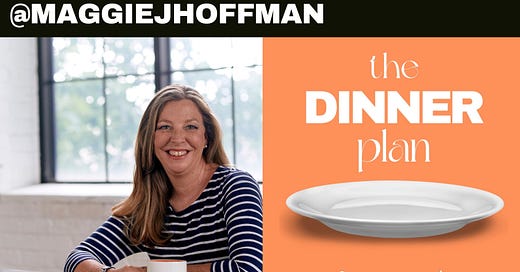






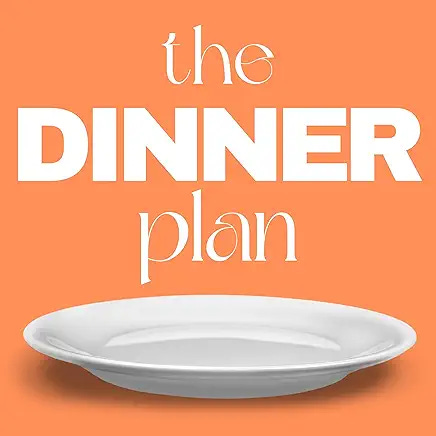

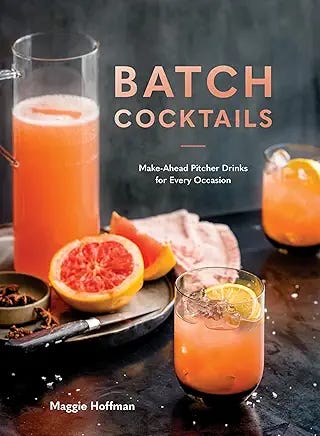

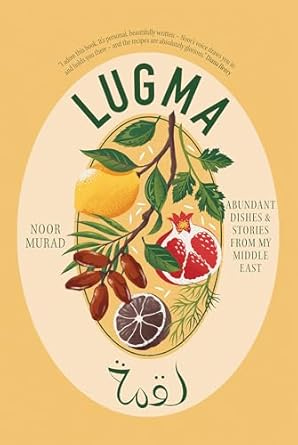
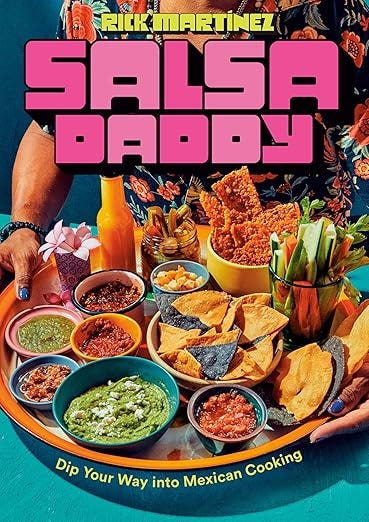





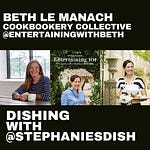
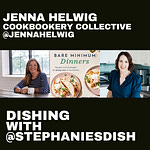


Share this post